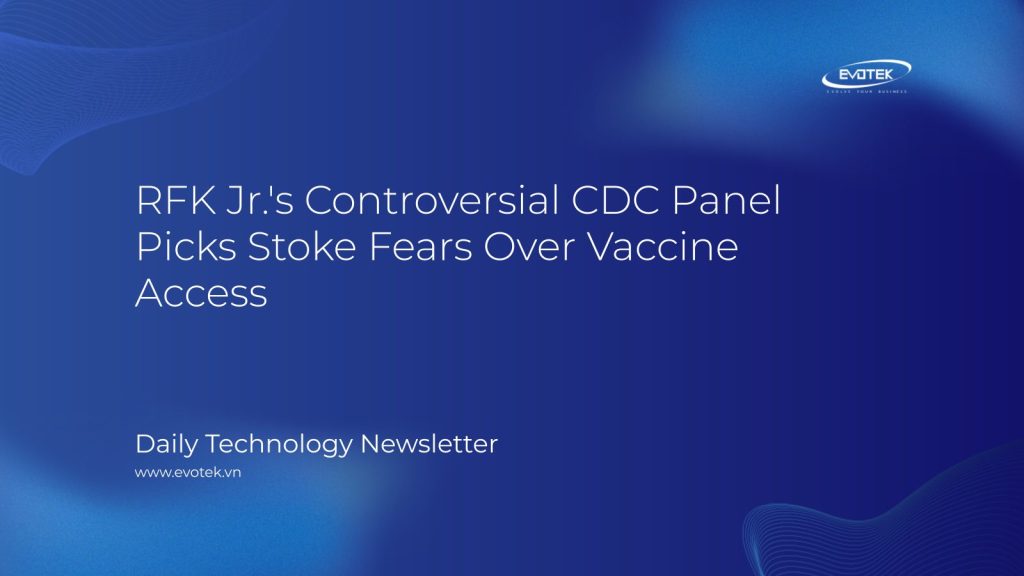Secretary Robert F. Kennedy Jr. has once again sparked debate and concern with his latest appointments to the federal advisory committee responsible for setting national vaccination guidelines. The addition of five new members, many with documented anti-vaccine stances and questionable qualifications, follows a significant overhaul of the committee earlier this year. Public health experts now voice serious apprehension regarding the committee’s upcoming meeting and its potential to restrict access to crucial childhood and adult vaccines.
The Advisory Committee on Immunization Practices (ACIP), which guides the Centers for Disease Control and Prevention (CDC) on vaccine policy, saw all 17 of its highly qualified, thoroughly vetted members removed by Kennedy in June. He swiftly replaced them with seven hand-picked allies, many already known for their skepticism towards established public health views or direct opposition to vaccines. Two existing members, including the newly appointed chair, have also reportedly received payments to testify against vaccine manufacturers, raising clear conflict-of-interest questions.
New Appointments Fuel Public Health Concerns
The five new individuals joining ACIP bring a range of backgrounds, but their past statements and affiliations are raising significant red flags:
-
Catherine Stein, PhD
A professor from Case Western Reserve University, Dr. Stein has previously opposed vaccine mandates. She notably penned an article in 2021 suggesting that fear of COVID-19 could weaken religious testimony, drawing a comparison to leprosy, which she incorrectly described as highly contagious. Dr. Stein has also made unsubstantiated claims in testimony to the Ohio Legislature, falsely attributing deaths and severe harms to COVID-19 vaccines.
-
Kirk Milhoan, MD
A pediatric cardiologist, Dr. Milhoan is associated with the Independent Medical Alliance (formerly FLCCC Alliance), an organization known for promoting COVID-19 misinformation and unproven treatments like hydroxychloroquine and ivermectin. He has publicly advocated for the removal of mRNA COVID-19 vaccines from the market, arguing for more testing before continued use.
-
Evelyn Griffin, MD
An obstetrician and gynecologist from Louisiana, Dr. Griffin reportedly lost her position due to refusing a COVID-19 vaccine. She has publicly asserted that doctors “blindly believed” in the safety of mRNA COVID-19 vaccines and has claimed these vaccines cause “bizarre and rare conditions,” assertions not supported by scientific consensus.
-
Hillary Blackburn
A pharmacist based in St. Louis, Blackburn’s appointment has also drawn attention. Reuters reports she is the daughter-in-law of Senator Marsha Blackburn (R-Tenn.), a vocal opponent of vaccine mandates.
-
Raymond Pollak, MD
A semi-retired transplant surgeon, Dr. Pollak was previously involved in a whistleblower lawsuit against the University of Illinois Hospital in 1999. The suit alleged manipulation of patient data to increase liver transplant success rates, which the hospital settled for $2.5 million while denying wrongdoing.
Critical ACIP Meeting Looms: Vaccine Access Hangs in the Balance
The newly configured ACIP is scheduled to convene later this week, on September 18 and 19. The posted agenda indicates crucial votes on recommendations for several key vaccines: the measles, mumps, rubella, and varicella (MMRV) combination vaccine, the Hepatitis B vaccine, and the latest updated COVID-19 vaccines.
Alarm bells are ringing across the public health community. Experts widely fear that the committee may move to rescind existing recommendations or implement restrictions on access to these vital vaccines. Such actions would likely erect significant, potentially insurmountable, barriers for individuals, including children, seeking to receive these essential immunizations.
ACIP recommendations are critical because they ensure that private health insurance plans and the federal Vaccines for Children program cover these vaccines. This program is a lifeline for approximately half of American children, including those eligible for Medicaid or who are uninsured or underinsured. Without ACIP’s endorsement, insurance coverage becomes uncertain, and vulnerable children could entirely lose access to life-saving vaccinations, posing a grave risk to public health and disease prevention efforts.

 日本語
日本語 한국어
한국어 Tiếng Việt
Tiếng Việt 简体中文
简体中文